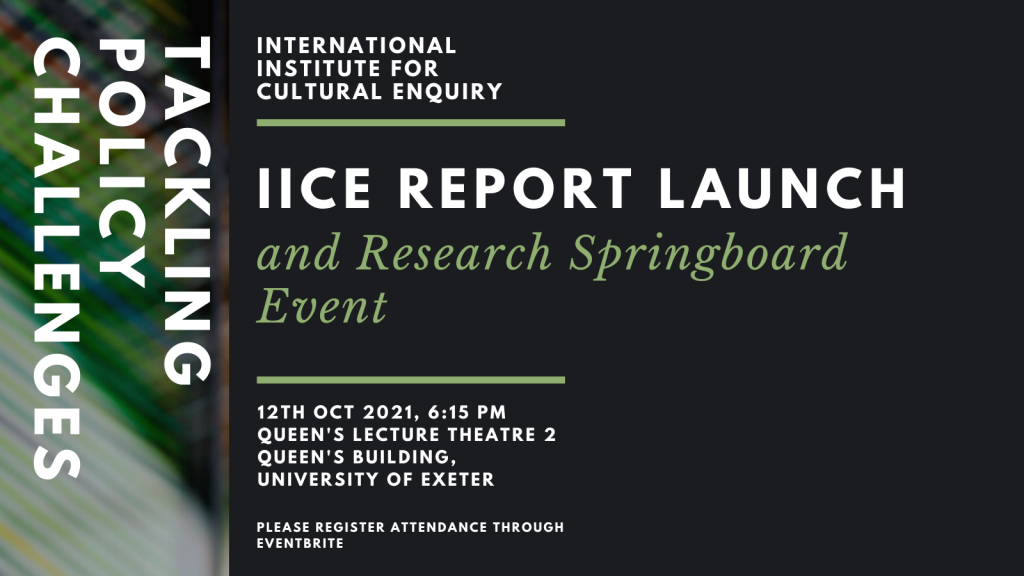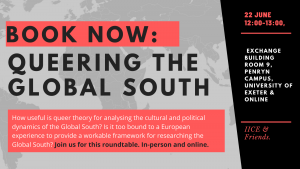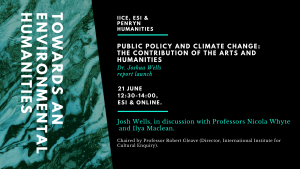IICE presents, supports and co-hosts a rich programme of events, lectures and conversations with internationally recognised and local experts, researchers cultural practitioners and other collaborators at the forefront of contemporary thought. Take a look at our forthcoming and previous events below to find out more and get involved.
Forthcoming Events:
Confronting the Colonial Archive: Workshop and Display – POSTPONED
The University of Exeter (UoE) Special Collections and Heritage Collections are providing a rare chance for people to interact with their colonial archive, sponsored by the International Institute for Cultural Enquiry (IICE).

Date: TBC
Time: TBC
Where: Streatham Campus
About:
The workshop will include display items from the rich collections of archives in Special collections. These will include archives of enslavement from the Gale Morant estate papers. These papers are from two families (Gale and Morant) who settled in Jamaica in the 17th century and became linked by marriages. Both acquired many plantations, estates, and great wealth; the estates were handed down to subsequent generations. Find out more here.
Participants will learn about the benefits and limitations of catalogue descriptions in providing access to colonial archives, and will explore issues surrounding both historic and current work in this area.
Participants will have the opportunity to discuss both old and recent descriptions of these particular archives from our catalogues entries and will also be able to write their own descriptions of the material based on their ideas of what information is essential for understanding the content. We will then move into a group discussion about how we present and describe archives that might have challenging and difficult content for many readers and researchers.
All are very welcome and this might be of particular interest to PhD students, early career researchers and researchers working on colonial archives, or interested in the practice of decolonization.
Presenters:
The workshop will be run by Annie Price, Archivist in Special Collections, and Christine Faunch, Head of Heritage Collections.
Twitter handles: @ExeterUniLib & @UoEHeritageColl
Lunch will be available.
*This event is for members of UoE ONLY. If you are not from UoE, please do not register.
**The University’s current information on Covid-19 can be found here: Staff | Coronavirus (COVID-19) – information and advice | University of Exeter.
Although it is recommended to still wear a face mask, it will not be mandatory at this event.
Previous Events:
Confronting the Colonial Archive
The University of Exeter’s Heritage Collections and Special Collections host this internal* seminar event, looking at the issues and debates surrounding records research and record-keeping.

Date: Tuesday 21st June
Time: 13:00 – 14:30
Where: On-line via Zoom call.
Please register here. Registration closes 21st June 9:00am.
Speaker 1 – William Gallois: Do we need a moratorium on colonial history?
Archives have the capacity to provide endless materials for scholars of imperialism and coloniality. The scale of information gathering in empire was so extensive that, especially in an age of digitisation, there is no conceivable end to the goal of documenting and analysing the structuring of forms of injustice or the fabrics of colonial control, alongside the making of comparisons of imperial world-making in particular places across distinct moments.
What, though, might archives offer to today’s scholars if they were not primarily mined as bodies of evidence which reinforced that which we already know, but seen as repositories in which other modes of life might be recovered? If the virtues of colonial and imperial history have reached a point of emptiness, how might the harder work of exploring the lives and cultures of colonised peoples be centred and spoken of in the world today?
Bio: William Gallois is Professor of Mediterranean and Islamic History at the Institute of Arab and Islamic Studies
Instagram handle: @thepaintersofthecity
Speaker 2 – Annie Price:
Cataloguing is the process of creating formal descriptions to represent archive materials, enabling people to find, search and use archives for research, inspiration or enjoyment. The legacy of colonialism has had a lasting impact on the ways archives have been catalogued, both in terms of what has been catalogued and how it has been catalogued. Recent years have seen a growing awareness within the archive community of issues with traditional approaches to cataloguing, as well as a greater interest in ethical cataloguing practices, especially in regard to culturally sensitive materials.
The University of Exeter Library’s Special Collections looks after more than 470 archives and archival collections, for which descriptions are available to browse via an online catalogue. This presentation will discuss recent work undertaken to identify insensitive descriptions, offensive language, bias and erasure in our catalogues, as well as the measures that have been taken to provide access to our archives in a more accurate, sensitive and respectful way.
Bio: Annie Price is an archivist at the University of Exeter Special Collections.
Twitter handle: @_annierprice @UoEHeritageColl
Speaker 3 – James Downs:
Exeter University has almost fifty different archives categorised as relating to ‘the Middle East’, while the Arab World Documentation Unit (AWDU), also housed in the Old Library, contains some 100,000 items. Together, this comprises a large amount of printed and manuscript material that, while rich and diverse in its subject coverage, reflects the interests, histories and perspectives of those who have created, catalogued and curated these collections.
What challenges and responsibilities are involved in managing specialist collections such as these? What can an archivist do to encourage more diverse approaches to use of these collections, in terms of cataloguing, promotion, and working with university staff, students and external researchers?
Bio: James Downs is Archivist of the Middle East Collections, Project Manager for the Digital Archive of the Middle East (DAME) and acting librarian for the Arab World Documentation Unit (AWDU)
Twitter handle: @james_al_downs @UoEHeritageColl
Speaker 4 – Diana Valencia-Duarte:
From a Latin American perspective, I recognise decolonial research as that research and knowledge building practice which acknowledges and even promotes alternative epistemologies and recognises them as equally valid to a scientific or, in our case, historical work. This implies sentipensar (thinking/feeling) outside the box of the Western/Anglo-centred/Euro-centred historical tradition. This represents a challenge for the archive, which is itself a bastion of the colonial historical tradition based only on the written material. When I speak of ‘colonial tradition’, I am not referring to the Colony as a timeframe of domination, but to its legacies which have created contemporary colonialisms or colonialities. Contemporary colonial thinking is still today sometimes imposed as a revealed ‘truth’ upon alternative ways of seeing the world and creating knowledge such as decolonial feminisms, Indigenous, Black or Afro-descendant, peasant and popular epistemologies. Therefore, a decolonial historical research challenges – and obviously does not reproduce – those contemporary colonialities of being, power and knowledge when we plan, conduct or publish the research.
Along my talk, and considering the previous paragraph, I would like to address questions such as: How do I approach archives as a decolonial historian? How are voices of the ‘otherness’ present in archives that they have not created? And what are archives, what constitutes an archive, is it only written material? Can we think of the oral traditions as a form of archive, albeit uncategorised and uncatalogued? How might we avoid epistemic extractivism and the epistemicide in our research?
Bio: Diana Valencia-Duarte (Ella/She/Her) is a PhD candidate in History in the University of Exeter. Her research focuses on peasantries and is based on oral memory, environmental history and decolonial, participative, and interdisciplinary approaches.
Twitter handle: @DIANA_VAL
Chair: Christine Faunch, Head of Heritage Collections at the University of Exeter.
*This event is for University of Exeter staff/students ONLY. If you are not a member of the university please do not register.
The Ukraine Crisis in Context: The Past and Future of Asylum practice in the UK
The IICE hosts this event in collaboration with the University of Exeter’s (UoE) Routes: Migration, Mobility and Displacement Network, and the Ukraine Advice Project.

Date: Monday 23rd May 2022
Time: 12:30 – 14:00
Where: On-line via Zoom.
Please register here. Registration closes on 20th May.
Abstract:
The British government’s response to refugees from Ukraine has coincided with the passing of the Nationality and Borders Act and the announcement of plans to outsource refugee protection to Rwanda. These events suggest a drive to differentiate between refugees based on criteria that are not supported by international law, and aim to reduce or outsource government obligations under the Refugee Convention. This seminar will discuss the schemes that apply specifically to Ukrainian nationals in the wider context of the Act, and of developments in the system for refugee protection in the UK. It will take a comparative view, looking at Canada’s private refugee sponsorship programme, and a historical one, considering when and how British governments have been selective in their acceptance of refugees. The seminar will consider whether these new developments indicate a long term change in the system of refugee protection within the UK.
Chair: Helena Wray – UoE Routes: Migration, Mobility and Displacement Network
Speakers:
Alison Harvey – No5 Barristers Chambers
Professor Audrey Macklin- University of Toronto
Colin Yeo- Garden Court Chambers
John Vassiliou- Shepherd and Wedderburn
Miranda Butler – Landmark Chambers

1948-1951: Race, Return and the Politics of Humanitarianism in Palestine
In collaboration with the Exeter Decolonising Network (EDN), the IICE presents Dr. Shaira Vadasaria

Date: Thursday 19th May
Time: 13:00 – 14:30
Where: On-line via Zoom.
Please register here. Registration closes on 17th May.
Abstract:
The unresolved repatriation of expelled Palestinian refugees during the onset of the Nakba raises important considerations in a settler colonial era of reparations. One line of inquiry that remains relevant for thinking about the future of Palestinian return is how, and upon what conditions did an Indigenous society with historical ties to land come to be governed as refugee subjects external to the land? Despite the United Nations Mediator’s recommendations on Palestinian return in the immediate aftermath of Israel’s state declaration, why did the UN ultimately prioritize the distribution of humanitarian aid over land repatriation for a newly displaced native Palestinian society? The significance of this inquiry is that the 1947-48 wave of Palestinian displacement took place at the onset of a post-World War II era – a time of consolidated nation-state building and the emergence of citizenship regimes. How ideas about indigeneity and refugeehood came to form at this historical moment has important implications for questions of racial redress, present and future. This lecture revisits a set of progress reports issued by Count Folke Bernadotte, the first UN appointed Mediator on Palestine to think further about the racial politics of expulsion, humanitarianism and return in the early months and years following the onset of the Nakba.
Speaker Bio:
Dr. Shaira Vadasaria is a Lecturer in Race and Decolonial Studies in the Department of Sociology at the University of Edinburgh and Associate Director of RACE.ED. Her research and teaching draws on interdisciplinary thought attentive to race, law and social regulation in the broader context of settler colonial nation building. Her work is anchored in methodologically driven questions concerning circuits of race and racial violence as they travel geographically and epistemically, paying close attention to the persistence of racial violence and freedom under settler colonial life. Some of her journal publications can be found in Social Identities: Journal of Race, Nation and Culture; Critical Security Studies and Oñati Socio-Legal Series.
Twitter handle: @Svadasaria
Transformative Encounters Workshop
As an emerging network, we would like to invite anyone interested in collaborating in research around how people’s minds interact with ‘objects’, objects of all sorts for example; material, visual, textual, natural, manufactured digital &/or technological.
Date: Monday 16th May 2022
Time: 10:00 – 15:00
Where: Streatham Campus or by Video link.
Please register here. Registration closes on Tuesday 10th May.
Further information: Please read below or email Maria Scott or Meredith Hale.
Vision statement: Transformative Encounters
The ‘Transformative Encounters’ emerging network represents the breadth and depth of interdisciplinary research across the Humanities and Sciences at Exeter and provides a dynamic platform for further growth. Our goal is to represent the vitality of the university’s interdisciplinary research community and to explore new avenues of collaborative enquiry and engagement with the broader community. The emerging network brings together scholars from disciplines such as psychology, social sciences, education, philosophy, art history, literary studies, and neuroscience who are exploring how minds interact with objects of all sorts; material, visual, textual, natural, manufactured, digital &/or technological.
The emerging network is co-led by Meredith Hale (AHVC) and Maria Scott (MLC), who are, in their own research, engaged with the subject of encounters with aesthetic objects and texts. They have secured College of Humanities discretionary research funding for an internal University of Exeter workshop, which takes place on 16th May 2022.
The workshop will have two broad goals. First, it will initiate fruitful dialogues that allow us to bridge the methodological boundaries that often separate disciplines classified as either ‘humanities’ or ‘sciences’. Second, it will establish the identity and future goals of the emerging network with a view to applying for official research network designation by the university. Conversations about the place of transformative encounters in our research will set the scene for potentially transformative research encounters and lay the groundwork for future collaborations.
The ‘Transformative Encounters’ network will become a locus of expertise that has the potential to be valuable not just to academics but also to clinicians, arts and heritage practitioners, educators, urban planners, policy makers, and others.
The Climate Justice Paradigm
In collaboration with Exeter Decolonising Network (EDN), IICE presents Ashish Ghadiali

Date: Thursday 7th April 2022
Time: 12.15pm – 1.45pm
Where: You will be sent a calendar invite or an event link once you register here (Register by 9am on Wednesday 6th April).
Reflecting on research currently in progress at The University of Exeter’s Global Systems Institute (GSI), as part of the Open Society Foundations-funded research and public engagement project; Addressing the New Denialism, Ghadiali will explore how the global failure to meet the ambition of the 2015 Paris Agreement points towards underlying flaws in the dominant paradigm for intergovernmental climate action, and how an alternative paradigm focused on justice, not growth, must be central to future governance strategies.
There will be time for Q&A and further discussion.
Ashish Ghadiali is a Strategic Consultant for Climate Justice at the GSI. He is also Co-Chair, with Professor Paul Gilroy, of the Black Atlantic Innovation Network at the UCL Sarah Parker Remond Centre for the Study of Racism and Racialisation, as well as a founding partner of Radical Ecology CIC. He writes on art, books and ecology for The Observer and was Director of the critically acclaimed 2016 feature documentary: The Confession.
Promises of the Past: Temporality, space and memory in Egyptian anticolonial history
In collaboration with Exeter Decolonising Network (EDN), IICE presents Dr Sara Salem (LSE).

Date: Thursday 17th March 2022Time: 13.00 – 14.30Where: You will be sent an event link once you register here. (Register by 9am on Wednesday 16th March).
This talk explores what it might mean to read the history of anticolonialism in Egypt through the contradictory figure of Gamal Abdel Nasser. It will be Chaired by Dr Katie Natanel (EDN) with time for discussion.
In Egypt, images of Abdel Nasser appear in the back of taxis, on the walls of small, cramped shops, and occasionally in street protests above a sea of chanting faces. This phenomenon crosses Egypt’s borders too, suggesting historical connections that have eroded, shifted or disappeared over time. The talk traces some of these representations across time and space, asking what these do, represent, and excavate. Through this, I explore a series of questions about how Abdel Nasser haunts both Egypt and the broader anticolonial movement in the region through these representational traces.Sara Salem is an Assistant Professor in Sociology at the London School of Economics. Her research interests include postcolonial studies, Marxist theory, and global histories of anti-colonialism. Her recently published book with Cambridge University Press is entitled Anticolonial Afterlives in Egypt: The Politics of Hegemony (2020). She is currently thinking, writing and dreaming about ghosts and anticolonial archives.
Problematic Shakespeare
Date: Monday 7th March 2022Time: 13.00 – 14.30Where: You will be sent an event link once you register here. (Register by 9am on Monday 7th March).

A recent piece in The Daily Mail noted with evident disappointment that;“Woke attacks on Shakespeare’s works have so far been relatively restrained” (Hands off the Bard!, 8/2/22).
Yet in their treatment of gender, race, religion, disability, and violence, many of Shakespeare’s works are inescapably problematic, a phenomenon often enhanced by editorial and performance traditions.
Without succumbing to the simplistic binaries of the media-driven “cancel culture” debate, this symposium surveys Shakespeare’s troubled present and charts possible futures.
– Which plays or aspects of the plays are equipped to thrive in contemporary society, and which are more problematic?
– When and how does adaptation provide a way forward?
– What can or should we leave behind?
The symposium will be chaired by Prof. Regenia Gagnier (Exeter), with speakers including Dr. Nora Williams (Essex), Dr. Naomi Howell (Exeter), Prof. Ayesha Mukherjee (Exeter), Prof. Philip Schwyzer (Exeter), and Dr. Vicky Sparey (Exeter). There will be time for discussion and Q&A.
White Innocence: Eastern European Populism and the Politics of History
In collaboration with the Exeter Decolonising Network (EDN), IICE presents: Professor James Mark (University of Exeter) and Zoltan Ginelli (Decolonising Development COST Action)
Date: Thursday 3rd February 2022
Time: 12.00 – 13.15
Where: You will be sent an event link once you register here.
In this seminar, our speakers will introduce what is currently at stake in history writing in Eastern Europe, in the context of populist politics and consider the potential of decolonising the region’s history.
This will be followed by two brief papers:
- ‘Wilson’s White World: The Creation of Eastern European Nation States, and the Erasure of Raced Origin Stories’ from James Mark.
- ‘Hungarian Indians: Race, Colonialism and Memory Politics in Hungarian ‘Indian Play’’ from Zoltán Ginelli.
There will be time for a Chaired open discussion with the audience, in which we might consider the broader relevance of the Eastern European case.
Speaker Bios:
Professor James Mark is a historian at the University of Exeter (UoE). His most recent work has focused on the politics of history writing in Eastern Europe, and writing the region into global histories of colonialism and anti-colonialism. His recent books include the co-edited Alternative Globalizations. Eastern Europe and the Postcolonial World (2020), and the co-written 1989: A Global History of Eastern Europe (2019) and Socialism Goes Global the Soviet Union and Eastern Europe in the Age of Decolonisation (2022).
James is part of the Exeter Decolonising Network (EDN); which is a collective of staff, students and community members affiliated to the UoE. Network members collaborate across the Southwest to advance progressive knowledge and best practise around decolonial thoughts.
Zoltán Ginelli is a critical geographer, historian of science and global historian interested in Hungarian connections to colonialism, anti-colonialism, decolonisation and race, and the relations between Eastern Europe and the Third World. He co-curated the art and documentary exhibition project ‘Transperiphery Movement: Global Eastern Europe and Global South’ (transperiphery.com) and established the Decolonising Eastern Europe group. Currently he is working on two books, one on the global history of the ‘quantitative revolution’ in geography and another for Cambridge University Press with James Mark and Péter Apor on Hungarian colonialism and anti-colonialism. See his work at zoltanginelli.com.
Zoltan received scholarship funding from COST Action; COST (European Cooperation in Science and Technology) is a funding agency for research and innovation networks. Their actions help connect research initiatives across Europe and enable scientists to grow their ideas by sharing them with their peers. This boosts their research, career and innovation.
Report Launch – Tackling some of the most significant topics in policy making: climate change, racial justice and rural policy.

Climate change, racial justice and rural policy are three of the biggest policy challenges we face today. These pressing social issues require urgent, focused engagement from the Humanities and Social Sciences in order to find credible solutions.
The International Institute for Cultural Enquiry team invites you to our upcoming launch event which will present the findings. We welcome you to join the ongoing conversations on how together we can action some of the recommendations in these reports. We hope the event will also offer an interesting and relevant networking opportunity over refreshments.
Architecture & Design: Sandpit 2
Tuesday 7th Sept 2021 – (10 am to 12 noon) Queen’s MR2 + 3.
 with an interest in any aspect of “Architecture & Design” to join us for our second exploratory sandpit. We are an informal group, drawn from all Colleges and campuses, with a shared commitment to exploring one or more of the following (or related) themes:
with an interest in any aspect of “Architecture & Design” to join us for our second exploratory sandpit. We are an informal group, drawn from all Colleges and campuses, with a shared commitment to exploring one or more of the following (or related) themes: - Sustainable architecture & design (incl. renewables), technology and innovation
- Urban and rural studies, landscape, heritage, and tourism
- Spatial practices including in AI/digital and in the exploration of embodied experience
- Architecture & design for wellbeing
- Theory and practice of architecture & design, including historical and contemporary methodologies
- Architecture & design cultures and discourses (incl. in film, literature and theatre).
National Syndromes: A one-day symposium on the interface of nationalism and health in the situation of Covid-19.
-
Tuesday 1st July 2021 (14:00 – 17:00 BST) online– With Alexandre White (Johns Hopkins), Amy Hinterberger (KCL), Des Fitzgerald (Exeter), John Narayan (KCL), Lara Choksey (Exeter), Robbie Shilliam (Johns Hopkins) andRos Williams (Sheffield).
 This one-day symposium explores intersections of health and biomedicine, racism and racialisation, and renewed imperial and colonial legacies in the conjoined context of COVID-19, Brexit and related international disasters. The symposium will draw together a range of different interventions in this critical space, to seek shared ground, develop new perspectives, and forge interdisciplinary research agendas. Referring to the paper “Brexit as Heredity Redux: Imperialism, biomedicine, and the NHS in Britain” (2020) by Fitzgerald, Hinterberger, Narayan and Williams, the symposium will consider topics such as nationalism and health in the situation of Covid-19, biomedical ethics and empire, and the racialisation of urban environments as sites of contamination.
This one-day symposium explores intersections of health and biomedicine, racism and racialisation, and renewed imperial and colonial legacies in the conjoined context of COVID-19, Brexit and related international disasters. The symposium will draw together a range of different interventions in this critical space, to seek shared ground, develop new perspectives, and forge interdisciplinary research agendas. Referring to the paper “Brexit as Heredity Redux: Imperialism, biomedicine, and the NHS in Britain” (2020) by Fitzgerald, Hinterberger, Narayan and Williams, the symposium will consider topics such as nationalism and health in the situation of Covid-19, biomedical ethics and empire, and the racialisation of urban environments as sites of contamination.
This event is developed in partnership between IICE, the Wellcome Centre For The Cultures + Environments of Health, Exeter Decolonising Network and the University of Exeter.

*The email address you supply when you register for your free place will be used to invite you to the online seminar closer to the event. This email will also contain instructions on how to join the online seminar.
Queering the Global South: an IICE Roundtable.
- Tue, 22 Jun 2021 (12:00 – 13:30 BST) in person and online– “Queering the Global South ” – with Sian Tydler (Geography), Rob Gleave (Institute of Arab and Islamic Studies) and Sabiha Allouche, chaired by Jana Funke (English and Sexuality Studies).
 How useful is queer theory for analysing the cultural and political dynamics of the Global South? Is it too bound to a European experience to provide a workable framework for researching the Global South? Join us for this lunchtime roundtable.
How useful is queer theory for analysing the cultural and political dynamics of the Global South? Is it too bound to a European experience to provide a workable framework for researching the Global South? Join us for this lunchtime roundtable.
Towards an Environmental Humanities: a Joint Seminar Between IICE, ESI & Penryn Humanities.
-
Mon, 21 June 2021 (12:30 – 14:00 BST) in person and online– Joshua Wells will be joined in conversation by Professor Nicola Whyte (Associate Professor in Landscape and Social History) and Dr Ilya Maclean (Associate Professor of Global Change Biology). The discussion will be chaired by Professor Rob Gleave (Director of the International Institute for Cultural Enquiry and Professor of Arabic Studies).
 Climate Change is one of the most pressing concerns we face in the contemporary moment, and one which requires urgent, radical attention. This seminar will bring together voices from the International Institute for Cultural Enquiry, the Environment and Sustainability Institute and Penryn Humanities to discuss the galvanising potential of Environmental Humanities in Cornwall and beyond, and launch ‘Public Policy and Climate Change: The Contribution of the Arts and Humanities’ by Dr. Joshua Wells- a new research paper forthcoming publication by IICE.
Climate Change is one of the most pressing concerns we face in the contemporary moment, and one which requires urgent, radical attention. This seminar will bring together voices from the International Institute for Cultural Enquiry, the Environment and Sustainability Institute and Penryn Humanities to discuss the galvanising potential of Environmental Humanities in Cornwall and beyond, and launch ‘Public Policy and Climate Change: The Contribution of the Arts and Humanities’ by Dr. Joshua Wells- a new research paper forthcoming publication by IICE.
*This seminar will have an in-person element for those with access to the Environment and Sustainability Institute at the University of Exeter’s Penryn campus. Those who attend will receive a complimentary lunch offering. We will also deliver this seminar online for those who do not secure an in-person place or who wish to attend online.
IICE in collaboration with the Exeter Decolonising Network : Lunchtime Seminar Series (May 2021)
Addressing the monumental imperative to reckon with structural racism, this series will consider the possibilities of social justice in the current moment from cross-disciplinary perspectives, across different organisations and economies of violence, and in forms of resistance, survival, and endurance.
- May 27th 2021 (12:30-14:00) – Dr Dhanveer Brar, Lecturer in Black British History in the School of History at University of Leeds. Knowing Manufacture of an RnB Feeling
 Join Dr Dhanveer Singh Brar, Lecturer in Black British History in the School of History at University of Leeds in conversation with Dr Lara Choksey, Postdoctoral Research Fellow, University of Exeter.
Join Dr Dhanveer Singh Brar, Lecturer in Black British History in the School of History at University of Leeds in conversation with Dr Lara Choksey, Postdoctoral Research Fellow, University of Exeter.
A paper will be shared with registered participants a week in advance to facilitate a workshop discussion.
“Knowing Manufacture of an RnB Feeling” is an essay on RnB as an aesthetic structure of thinking. Based around a response to the work of Free.Yard, in particular their piece REGNORTS (N22 MOMENTATION MIX) , the essay moves through debates in the field of black diasporic intellectual production concerning the politics of class, form and gender.
Find out more and register for a (free) space.*
*Attendees must register for this event by 5pm on 25th May. The event is open to all once registration is approved. University of Exeter participants use their UoE email for registration.
IICE
March 25th 2021 (15.30-17.30) – Andrew Clappison, Policy@Exeter IICE event ‘(Re-)imagining the ‘rural’ and (re-)shaping policy: Capturing and communicating contested narratives and hidden histories’
Interdisciplinary and practitioner workshop hosted by International Institute of Cultural Enquiry. Despite extensive research on the contested nature of rural culture(s) and acknowledgment in policy of the diversity of rural economies we seem to have reached an impasse, with dominant narratives of ‘the rural’ continuing to shape decision-making and accentuate the hidden realities of ‘rural’ life and culture. This workshop seeks to bring this issue back into focus by exploring how to bring greater agency to ‘rural’ society and explore how capturing and communicating contested narratives and hidden histories could be used more systematically to challenge this ongoing issue.
March 16th 2021 – Dr Ghee Bowman – “In Joseph Emidy’s footsteps: Cultural Contributions by People of Colour in the West Country” The Joseph Emidy Workshop
February 16th (16:00-18:00)- Sabiha Allouche (Politics), Susannah Cornwall (Theology and Religion), João Florêncio (Art History and Visual Culture), Jana Funke (English), Ting Guo (Modern Languages) and Ina Linge (Modern Languages). “Queering the Humanities” Seminar
LGBT+ History Month gives researchers a chance to reflect on the opportunities opened up by Queer Studies, and how Queer Studies and Theory has contributed – and will continue to contribute to the humanities research base in Exeter and beyond. In this 2-hour seminar, IICE brings together University of Exeter researchers using queer methodologies and approaches to discuss their research approaches and investigate both the history and the future of Queer Studies. The event included the discussion of research papers and a roundtable.
January 19th 2021- Architecture and Design Sandpit, coordinated by Jo Gill (English/PVC-Dean Humanities)
This was the first of hopefully a series of networking meetings, bringing together researchers working at the interface of design, architecture and humanities research. Areas of focus will include sustainability and renewables, urban, rural and heritage studies, design for wellbeing and spatial practices.
November 27th 2020 (12:30)- #BringBackOurGirls and Humanitarian Advocacy: Analysing Race, Gender, and Childhood in Local and Global Child-Saving Campaigns’
November 20th 2020 ( 12:30) – Dr Michael Pearce – to understanding and addressing racialised barriers to participation in nature tourism and conservation in South Africa.
November 13th 2020 (12:30) – Christine Robins, ‘Fragile Faiths: Endangered Religious Cultures in Dialogue’, a free online seminar
Exeter Decolonising Network
April 22nd 2021 (18:00-19:30)- IAIS, IICE the European Centre for Palestine Studies and the Exeter Decolonising Network: A conversation with Noam Chomsky and Ilan Pappé: On impasse, internationalism and radical change
From internationalism and the fight against racial capitalism, to creating strategies for climate justice and decolonisation, we invited Professors Chomsky and Pappé to speak to us about activism, discontent, resistance and responsibility. This conversation engages with the violence of the present, while moving toward liberation and justice in the future.
March 25th (12:00-14:00) – Dr Akanksha Mehta, Lecturer in Gender, Race and Cultural Studies Goldsmiths, University of Exeter – ‘Is This an Anti-Racist Occupation or Noh?’ Lessons on Discomfort and Solidarity from Goldsmiths Anti-Racist Action (GARA)
In this talk, Dr Akanksha Mehta will discuss how GARA and the occupation strengthened solidarity and survived as a movement because members routinely made space for intentional uncomfortable conversations within the collective. These conversations addressed the perpetuation and reproduction of forms of oppression within their organising focussed on dismantling and de-centring whiteness in non-performative ways, and were crucial to building a common agenda and fight towards structural racism within and outside the university.
30th March – Professor Byony Onciul, Associate Professor of Museology and Heritage Studies, University of Exeter – Connecting Strands on Current Indigenous Realities in the Americas
The talk intends to frame our discussions by beginning with Prof Bill Cohen, who will share a Syilx Okanagan approach to being a good ancestor. Following his Coyote Stories, we will have a round table discussion and questions from the audience. The event builds upon collaborative interdisciplinary work developed through multiple research projects with University of Exeter colleagues Prof Bryony Onciul and Dr Marisa Lazzari and University of British Columbia colleagues Prof Karen Ragoonaden and Prof Virginie Magnat.
November 5th (12:30) – Josie Gill (Bristol), ‘Race, Science, and Literary Studies in the 21st Century’.
December 10th (16:30) – Hazel Carby (Yale University): ‘Imperial Sexual Economies’.
